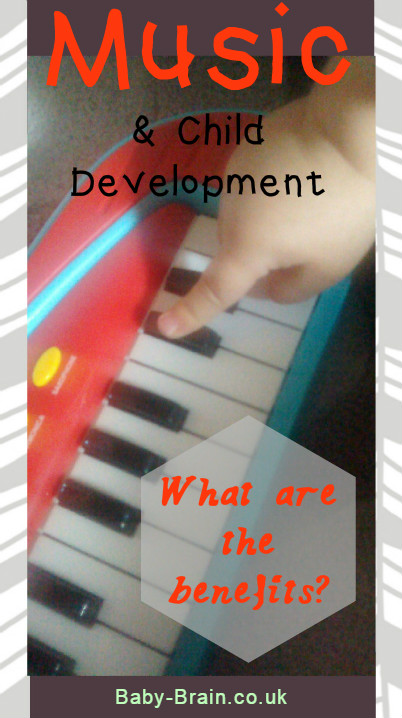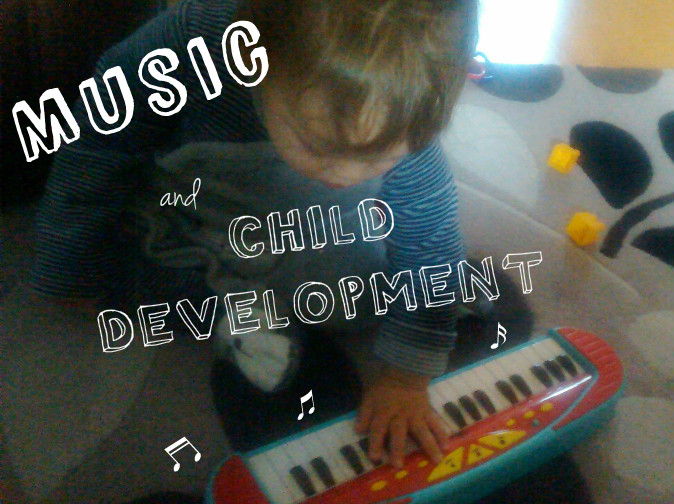How does music benefit children? What is the psychological research?
What are the benefits of babies and children playing music?
-
Social Development: music classes and playing music with babies and young children is going to involve a parent and probably other children too. The social elements of this (for parents too) are important. Also, turn taking, expression through a medium other than speech, and just having fun are going to be important elements. See the research below for findings that support the importance of interactive music making with baby.
-
Physical Development: playing an instrument requires good motor skills, both gross and fine. Baby bashing on a drum or shaking a rattle is an example of gross skills and more fine skills might come with pressing a key on a keyboard, or accurately hitting a note on a xylophone. Playing an instrument might also improve control and coordination skills in older children (see research below).
-
Psychological Development and Awareness:
– Cause and effect is a good one. Baby can learn that if they do one action (e.g. shake their hand up and down while holding a rattle) they have some effect (a noise) on their environment.
– Creativity
– Awareness of self and expression – I can make this noise, and express myself through it (especially as infants can not yet verbally communicate through speech).
– Encourages self-discipline, listening and concentration skills (see more about this from the research discussed below)
◊◊◊◊◊◊◊◊◊◊◊◊◊◊◊◊◊◊◊◊◊◊◊◊◊◊◊◊◊◊◊◊◊◊◊◊◊◊◊◊◊◊◊◊◊◊◊◊◊◊◊◊◊◊◊◊
INTERACTIVE music making is important:
Research as summarized here with very young children has found that:
One-year-old babies who participate in interactive music classes with their parents smile more, communicate better and show earlier and more sophisticated brain responses to music.
The infant brain might be particularly plastic with regard to musical exposure
The children in this study attended weekly music classes over 6 months. One class involved interactive music making and learning lullabies, songs with actions and nursery rhymes. Parents and babies worked together to learn to play percussion instruments, take turns and sing specific songs.
Another class involved parents and babies playing at various toy stations with recordings in the background.
Babies from the interactive classes showed better early communication skills, like pointing at objects that are out of reach, or waving goodbye. Socially, these babies also smiled more, were easier to soothe, and showed less distress when things were unfamiliar or didn’t go their way.
Babies who participated in the interactive music classes with their parents… preferred to listen to a version of a piano piece that stayed in key, versus a version that included out-of-key notes. Even their brains responded to music differently… [they] showed larger and/or earlier brain responses to musical tones.”
While both class types included listening to music and all the infants heard a similar amount of music at home, a big difference between the classes was the interactive exposure to music.
** Therefore, the interactive nature of the music classes appeared to be important, rather than passively listening to music in the background or playing with minimal interaction between parent and child.**
◊◊◊◊◊◊◊◊◊◊◊◊◊◊◊◊◊◊◊◊◊◊◊◊◊◊◊◊◊◊◊◊◊◊◊◊◊◊◊◊◊◊◊◊◊◊◊◊◊◊◊◊◊◊◊◊
Does playing music “IMPROVE YOUR KID’S BRAIN”?
I came across this interesting article (original journal article here): Could Playing Tchaikovsky’s “Nutcracker” and Other Music Improve Kids’ Brains? – Good question? What did the research find? The main summary of the findings was:
Musical training might…help kids focus their attention, control their emotions and diminish their anxiety.
They looked at children aged 6 to 18 years old, and associations between playing a musical instrument and brain development. They used a measure of “cortical thickness”, and write that as children age, the cortex (outer layer of the brain) changes in thickness. The researchers wanted to see what impact music training would have in the cortex. Interestingly, they found that:
Music playing altered the motor areas of the brain, because the activity requires control and coordination of movement.
Music practice influenced thickness in the part of the cortex that relates to “executive functioning, including working memory, attentional control, as well as organization and planning for the future”
What are the possible social applications of this?
-
Apparently, 3/4 of high school students in the US never or rarely take lessons in arts or music. Therefore, the authors suggest that it is important to find new and innovative ways to make music training more widely available to young people, and to start this during childhood.
◊◊◊◊◊◊◊◊◊◊◊◊◊◊◊◊◊◊◊◊◊◊◊◊◊◊◊◊◊◊◊◊◊◊◊◊◊◊◊◊◊◊◊◊◊◊◊◊◊◊◊◊◊◊◊◊
Playing music therefore appears to have an impact on skills and abilities such as attention, working memory, attention. What about just listening to music?
My Little Lovely (LL) and I attended a class called tiny Mozart when he was about 6 months old. It was ok. It involved listening to stories played out with musical accompaniment (It wasn’t particularly interactive between the parent and baby, though). So did it do his development any good?
◊◊◊◊◊◊◊◊◊◊◊◊◊◊◊◊◊◊◊◊◊◊◊◊◊◊◊◊◊◊◊◊◊◊◊◊◊◊◊◊◊◊◊◊◊◊◊◊◊◊◊◊◊◊◊◊
 What are the benefits of babies and children Listening to music?
What are the benefits of babies and children Listening to music?
-
The Mozart Effect – listening to classical music enhances intelligence? The “Mozart Effect” is probably a well known term by now. This became a popular saying in the mid-90s after a study (Rauscher & Shaw) reported that students who listened to 10 minutes of Mozart showed improvements on spatial tasks. The effect was brief, only lasting 10-15 minutes. There has been a lot of research around this and results on the impact on “intelligence” and IQ vary. Later studies found only a minimal increase in IQ (1.5 points, this is really not very much) and limited improvements on tasks.
-
Listening to classical music for primary school children, though, has been shown to have some benefits. A project that introduced primary school children to classical music reported that “children listened to a range of music from a selection of well-known classical composers including Beethoven…Mozart…and Mendelssohn. The process of listening to live classical repertoire enabled children to enhance their listening skills and develop other skills needed for careful listening, including concentration and self-discipline.”
-
As this article here sums up, there is minimal evidence that listening to classical music increases IQ, so instead enjoy the research like the project above that shows children enjoy classical music and it can encourage listening and concentration skills
◊◊◊◊◊◊◊◊◊◊◊◊◊◊◊◊◊◊◊◊◊◊◊◊◊◊◊◊◊◊◊◊◊◊◊◊◊◊◊◊◊◊◊◊◊◊◊◊◊◊◊◊◊◊◊◊
How to use music with baby and toddlers
-
Interactive music making seems important. Learn to play an instrument together. I’m not talking about both taking up the guitar, I mean even something simple like shaking a maraca together. Take it in turns to make sounds. Respond to baby and mirror or echo their response. You could sing together too.
-
Singing is important for vocabulary development: “Singing songs teaches children about how language is constructed. When you sing, words and phrases are slowed down and can be better understood by your baby. Singing regularly will help your baby to build up a vocabulary of sounds and words long before they can understand the meaning”, according to this article from the BBC.
-
More on singing to baby: this article outlines some of the findings. It cites that babies are particularly responsive when the music comes from the parent directly, and singing along with a parent can help develop awareness and skills in reciprocal communication. Music and rhyme in nursery rhymes can impact on ability in spatial reasoning, which the article writes can enhance mathematical and scientific abilities.
-
The article continues, in addition to singing nursery rhymes add songs with actions and encouraging dancing to the music to help build balance, coordination, body awareness and rhythm skills.
-
Get creative with music making equipment. Use pots and pans, or make a simple shaker from an old plastic bottle filled with pulses, dried pasta or something that makes a noise. We made one using red lentils and tapioca (pictured left).
-
Look for local and free activities to get involved in. Local libraries where we are do baby singing sessions. They are about 30-45 minutes of singing nursery rhymes together in a big circle, using actions and sometimes props like colourful pieces of material to wave around and puppets (e.g. animal puppets for Old McDonald Had a Farm).
-
Enjoy listening to and experiencing the music with your child, rather than worrying if it’s the “right kind” of music or that it should be prescriptive somehow, e.g. you must listen to 10 minutes of Mozart a day in order to increase IQ. This is because the research is mainly reporting the benefits of music to be around skills of concentration, listening and discipline (among others).



Fascinating! This has just encouraged me to try out a local music class for babies!
Hehe, thanks so much! Make sure it’s interactive though!
My kids have been going to music from the time that they were babies. My daughters can now all play an instrument. I joke and say if I take up the drums we can start a band. Interesting read.
Well written! Musical therapy is a huge part of our household. It can un tap a child’s imagination. Thank-you for linking up to Bloggers Brags Pinterst Party and I have pinned this post!
This is super interesting. Wonderful facts. My daughter loves listening to music! Thanks for linking up on #ToddlerFunFriday!